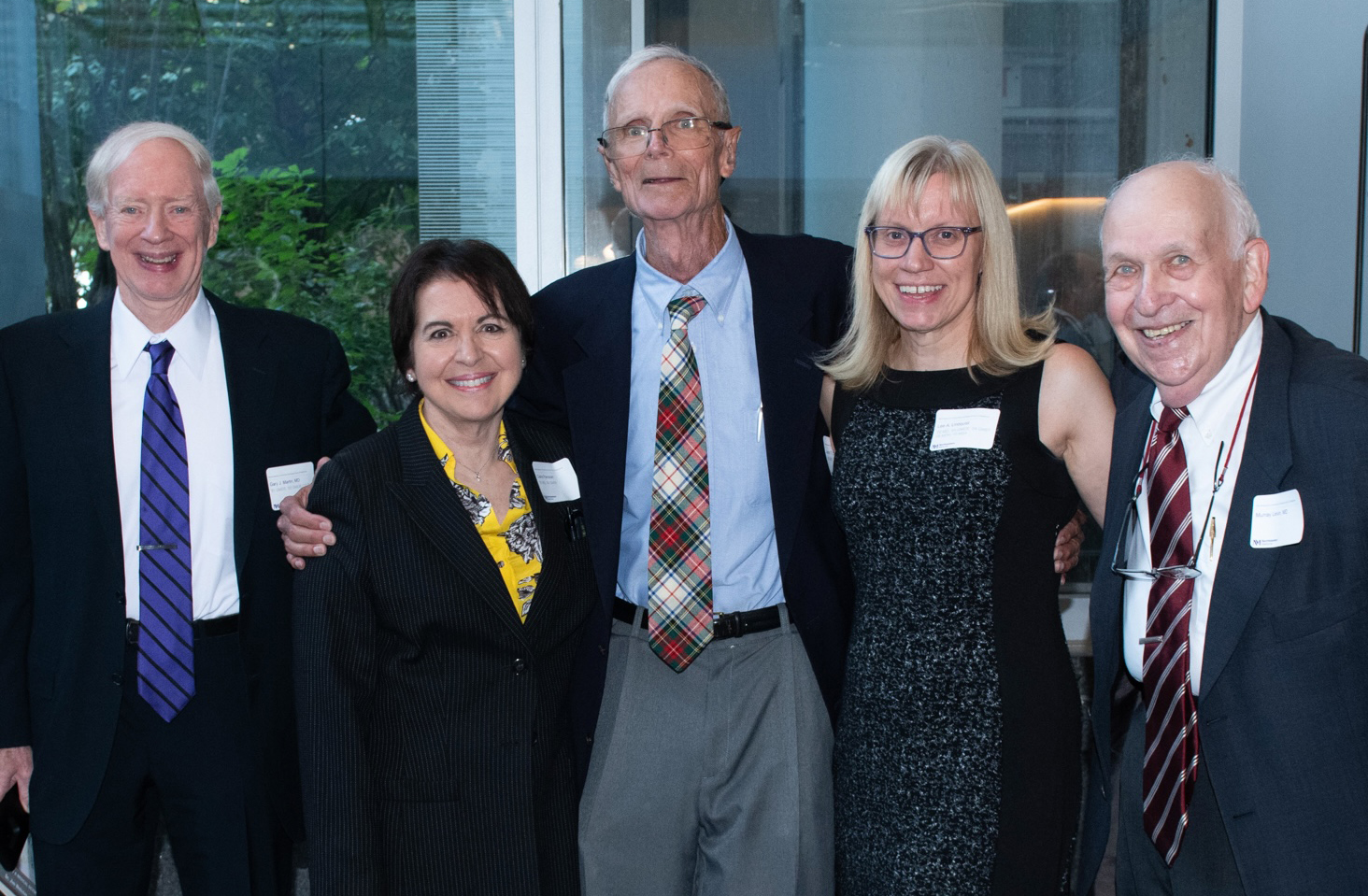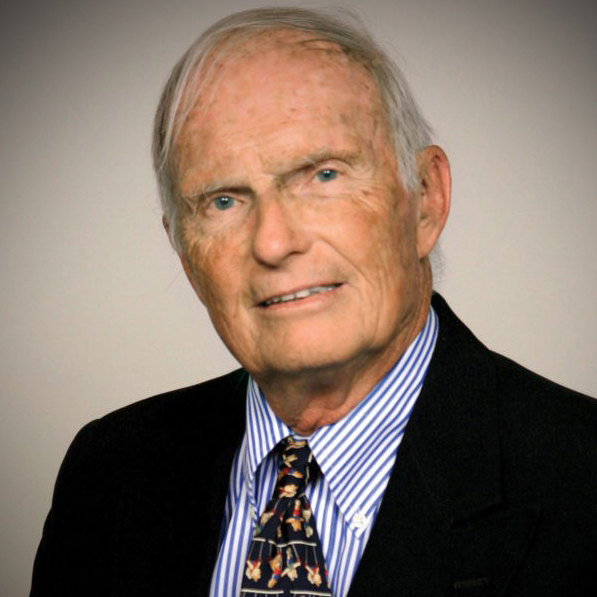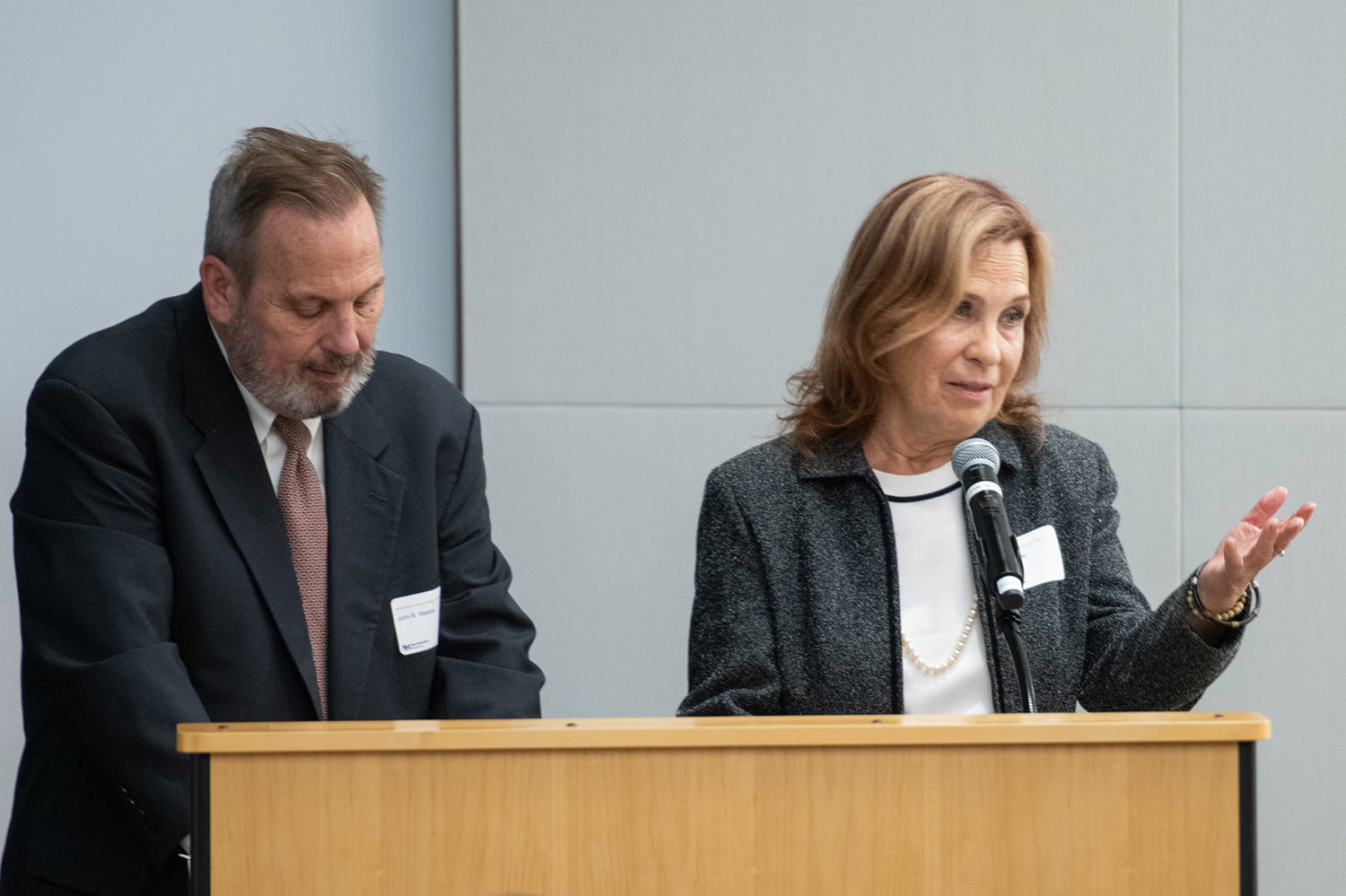Dr. Webster Remembered for Lifelong Service to Medicine and Public Health

About 130 alumni, faculty, family, and friends gathered October 10 for a celebration of life for the late James R. Webster Jr. ’53, ’56 MD, MS, ’60 GMER, ’64 GMEF, a renowned physician, educator, and leader who had a profound impact on Northwestern University Medical School (NUMS), now known as Northwestern University Feinberg School of Medicine, and Northwestern Medicine.
The event, held at the Louis A. Simpson and Kimberly K. Querrey Biomedical Research Center on the medical school campus in Chicago, also formally marked the establishment of the James R. Webster Jr., MD Scholarship. Attendees were encouraged to make a gift as a means to create a permanent legacy in Dr. Webster’s honor.
In remarks, many former associates attested to Dr. Webster’s compassionate care, institutional leadership, and belief that healthcare should be available for everyone.

A Chicago native and 1956 graduate of NUMS, Dr. Webster completed his residency at Chicago Wesley Memorial Hospital in 1960 and went on to serve in leadership roles at Northwestern Memorial Hospital, where he became a leading practitioner of geriatric medicine.
From 1988–2000, he directed the Buehler Center on Aging, and throughout his career, he held key board positions across Northwestern’s health system. He was also a longtime volunteer physician and donor at CommunityHealth, Chicago’s largest free clinic, and a passionate advocate for free healthcare. Among Dr. Webster’s many examples of leadership was his role in spearheading the initiative to eliminate smoking at Northwestern Memorial Hospital. In 2002, Mayor Richard M. Daley appointed him president of the Chicago Board of Health, during which time he was a major force behind the Smoke-Free Illinois Act of 2008, a statewide law prohibiting smoking in most enclosed public places and workplaces.
Remembering ‘a Mensch’
Former trainees and colleagues from across the spectrum of his career recalled Dr. Webster’s impact on their lives. Gary J. Martin, MD, ’81 GMER, ’82 GMER, the Raymond J. Langenbach, MD, Professor of Internal Medicine at Feinberg, began the memorial with reflections from his residency in 1978, highlighting Dr. Webster’s kindness and generosity toward him and other trainees.
“He’d pick an intern at random on a Friday night and then he would say, ‘Guess what? You don’t have to take call. I’m taking your place,’” Dr. Martin said. He would then take call himself, often paired with a fourth-year medical student. Dr. Webster’s calm, pragmatic approach to leadership stood out, Dr. Martin noted, especially in how he handled challenges. “‘Don’t overreact right away,’” he recalled him saying. “‘Some problems just resolve themselves with time.’”
Finally, he credited Dr. Webster’s mentorship with inspiring his own career decisions, choosing to work in the General Internal Medicine Division at Northwestern largely because of the respect he had for Dr. Webster and for John T. Clarke, ’64 MD, ’75 GMER, associate professor emeritus of Medicine, who also shared remarks at the event.
Dr. Clarke recalled meeting Dr. Webster as a resident in 1974 and observing Dr. Webster’s dedication to patient care, sharing a story of Dr. Webster arriving at 3 a.m. to help an intern manage a critically ill patient. Like Dr. Martin, he acknowledged Dr. Webster’s practice of taking call one night a month, adding, “Nobody does that kind of stuff. The whole house staff held him in awe.”
Dr. Clarke also credited Dr. Webster with helping lay the foundation for major institutional changes at Northwestern, including the formation of the general medicine section and the merger of Passavant Memorial Hospital and Wesley Memorial Hospital that created Northwestern Memorial Hospital in the early 1970s.
His interactions with the senior physician led him to realize, “When I grew up, I wanted to be like Dr. Webster. I want to be able to care for patients like Dr. Webster. I want to be able to teach like Dr. Webster. I want to know that there is no time when I won't drop everything I'm doing to care for a patient.”
Murray L. Levin, MD, professor emeritus of Medicine, called Dr. Webster “a mensch,” explaining that, in Yiddish, “It means being a good human being and one to whom we all have respect and love. And Jim Webster was a mensch.”
Dr. Levin recounted how he first came to appreciate Dr. Webster during a difficult period as chief of medicine at the VA, when Dr. Webster invited him to his office and offered him a glass of scotch to lift his spirits. That moment marked the beginning of a close friendship and professional collaboration.
“We all mourn his loss, but may we all just revel in his memory. A wonderful, wonderful man. And a great friend,” he said.
Claire Panosian, ’76 MD, ’80 GMER, reflected on Dr. Webster’s impact as a mentor and, more recently, as a friend and confidante. She recalled arriving at Northwestern in 1972 as a history major with little science background and how Dr. Webster’s encouragement helped her find her footing as a medical student. When faced with a demanding rotation, Dr. Webster simply told her, “You can do this,” a moment that she said gave her the confidence to persevere.
In one of their final exchanges, Dr. Webster expressed empathy for her husband’s hospice care around the same time he was planning his own end-of-life care. She concluded, “As the seasons of life pass, certain people stay with us forever. For me, Jim Webster was and always will be one of those unforgettable people.”
Lee Ann Lindquist, ’00 MD, ’03 GMER, ’04 GMEF, ’05 MPH, ’10 MBA, chief of Geriatrics and the George M. Eisenberg Research Professor of Geriatric Medicine, worked with Dr. Webster as a medical student, resident, and fellow—then, later, as a colleague and champion for aging research.
He made an impression on all he met, she explained. She said of his former patients, whom she inherited after his retirement, “Even those with Alzheimer’s dementia at late stages would remember Jim and ask how Jim was doing.”

Susan and John Webster, Dr. Webster’s children, also attended the celebration of life. While their father was widely admired, Susan told the crowd, he was modest about his accomplishments. “If Dad were here, he would say that he was terribly embarrassed,” Susan said to laughter.
After leading a 30-second, silent remembrance, she continued, “Long ago, my dad explained to me that death is part of life. He believed that. My brother, John, and I can tell you that he was at peace with dying, but he will always be with us.”
The Webster children also shed light on who their father was outside of his medical profession: someone who loved photography, sailing, muscle cars, and baseball.
Adam Epstein, Dr. Webster’s grandson, closed the memorial with a tribute: “Great men don’t just live long. They live well. That, I think, is the truest measure of a life well lived.”
Dr. Webster passed away on June 25, 2025, at the age of 93.